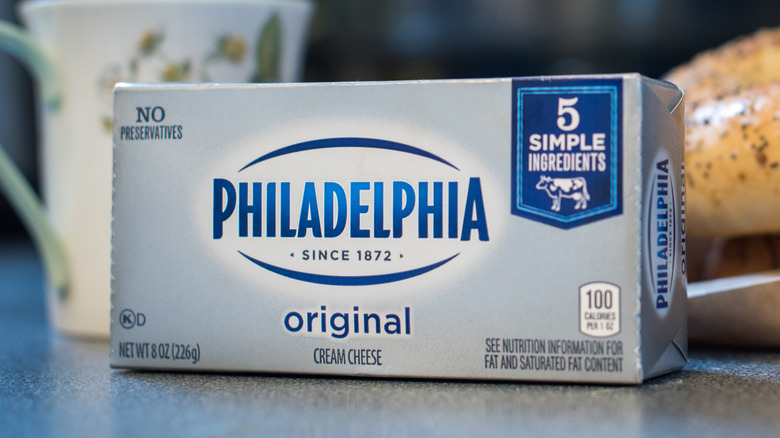No, Cream Cheese Was Not 'Accidentally Invented'
Cream cheese is ubiquitous in the United States, and in 2021, retail sales of the popular, soft, creamy, mild cheese were about 238.1 million dollars (per Statista). One of the most well-known brands of cream cheese is Philadelphia Cream Cheese, which comes in its iconic silver grey packaging with the word Philadelphia emblazoned across in blue. But American cream cheese as we know it today has a European precedent: Neufchatel, a semi-soft white cheese from Normandy, France (per Delishably).
Neufchatel dates back to 1035, but cream cheese itself isn't nearly as old. Most sources then state that in 1872, a New York dairyman by the name of William Lawrence who "accidentally stumbled on a method of producing cream cheese while trying to reproduce a French cheese called Neufchâtel" (per ThoughtCo.). As Bon Appetit reports, Lawrence subsequently began to sell his cream cheese with the brand name "Philadelphia" because, at the time, the state was famed for its dairy quality.
However, some food historians want to set the record straight: Cream cheese has been around in the U.S. for longer than most believe.
Cream cheese in America since 1769
In a letter to the editor of the Forward, writer Jeffrey Marx sets the record straight surrounding the myth of cream cheese being an accidental invention. Marx claims that while Lawrence was indeed the first man in America to sell and manufacture cream cheese on a large scale, "directions for making cream cheese can be found in a Pennsylvania newspaper as early as 1769" (per Forward). Marx expands upon the history of cream cheese for Food, Culture & Society with his 2012 essay, "The Days Had Come of Curd and Cream."
So while cream cheese wasn't accidentally invented by Lawrence, he did play a key role in its rise to dominance with clever marketing. Cream cheese has nothing to do with Philadelphia, and as for the date on the Philadelphia packaging that says "since 1872," Marx also thinks this is wrong. According to Mashable, Marx states that the year of Lawrence's entrepreneurial push was likely between 1875-77, and the backdating was another marketing ploy.

